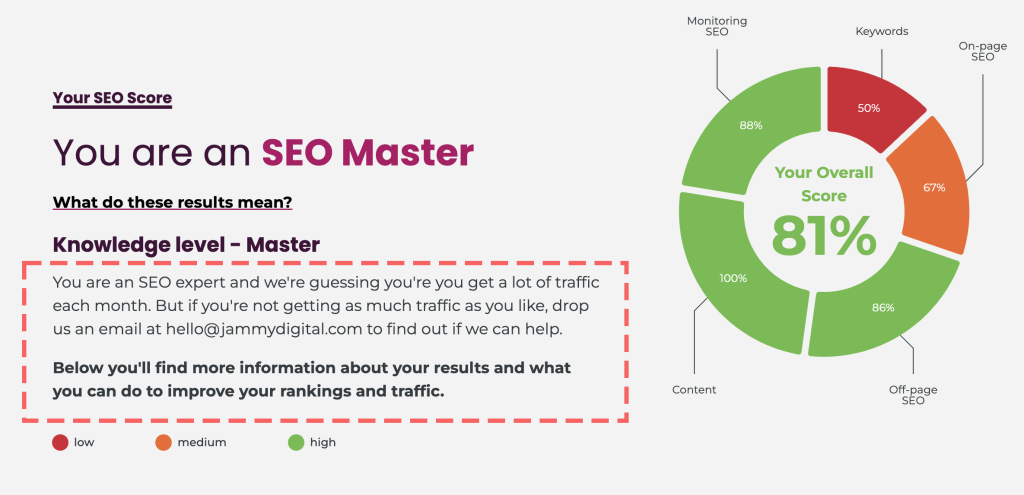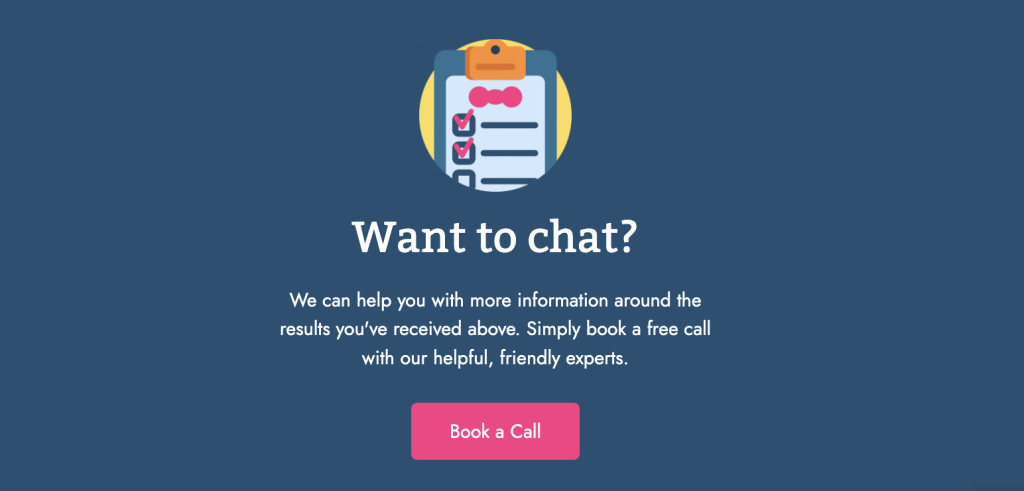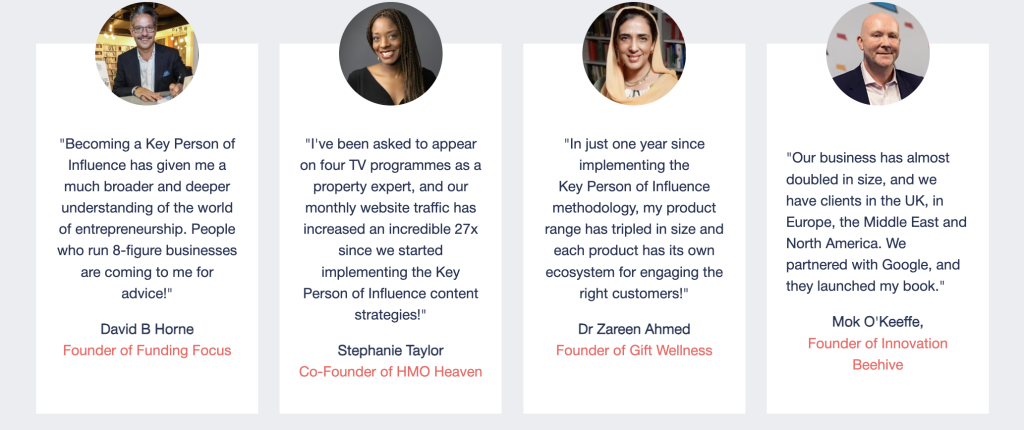What to include on your quiz results page


Launching a quiz for your business is exciting.
Quizzes are a fun and effective way to grow your audience and provide value at the same time.
There are a few things you will need to consider when building a quiz, one of which is a quiz results page.
When building a quiz, people often focus their time on the quiz landing page and the questions and leave the results page until the end. However, the results page is the page that will convert quiz leads into paying clients…if it’s done right.
That’s exactly what we’re going to teach you how to do in this article.
What is a quiz results page?
When someone has finished answering questions in an online quiz, they are presented with a results page. The purpose of this page is to:
- Give them their score
- Provide valuable insights
- Build your authority as an expert
- Build connection and trust with your leads
- Make them an offer
If you don’t tick all these boxes then you’re going to struggle to convert your leads into sales.
Please be aware, some of the best quiz maker tools don’t allow you to edit the results page so check this list out to see if you will have full access. If you’re using ScoreApp, don’t worry… we have a complete page builder for the results page.
Below, I’ve listed all the possible things you could include on your quiz results page so you can build a page that’s perfect for your audience and highly effective.
Quiz Score
For most online quizzes, the quiz score is the most important element on the results page. It’s the one thing your audience want to know after answering all your questions. This is why you want to make it big and bold, above the fold.

You want to place the quiz score high up on the results page so it’s the first thing people see when they complete the quiz.
How to present the quiz score
You have a few options when it comes to presenting your quiz score on the results page. This will depend on the type of quiz you have built, but for the most part, your visitor is expecting a score or grading based on how they answered the questions.
- Percentage e.g. you scored 67%
- Score out of 10 e.g. you score 7 out of 10
- Doughnut chart
- Pie chart
- Radar
- Speed gauge
- Temperature/thermometer
- Traffic light
- Single result e.g. your spirit animal is the dolphin
It’s always a good idea for you to think about matching the score display with the type of quiz you have built. For instance, if you have built a basic 10-question quiz, it makes sense to use “out of 10” score display. You probably wouldn’t want to use a doughnut chart with multiple categories as it’s probably more data than your audience needs.
On the other hand, if you have 20 questions+, then you would be able to provide more value if you categorise each question and use a pie chart or doughnut chart to display the results so your visitor can analyse the results more accurately.
Main Headline
Along with the score display, the main headline is the first thing people will see when they land on the results page. What you use as your main headline is important, and you want to get it right.

You have lots of options when it comes to the heading, and I’ve included a few examples below.
“Your quiz results” You could simply write this as your headline and let the chart or percentage deliver the results. This is the quickest and easiest headline you could use.
“You scored 7 out of 10” or “You scored intermediate” You could use the headline to tell them their overall grading, This is good if you are simple score tiers to determine their outcome, such as low/medium/high scores or basic quizzes.
“Your spirit animal is the dolphin” If you have built a personality quiz, then you might want to include the outcome within the main headline. Most personality quizzes do this as well as including an image on the results page.
“You have some work to do” or “Wow, amazing results” This kind of heading is bolder than the others, but it will trigger certain emotions and hopefully inspire action as a result. Just make sure that you choose your words carefully, as you don’t want to insult your visitors if they get a low score.
Quiz results Summary
Below the main headline on your quiz results, you can include a short summary/description of the results to give your visitors an overview. It could be 50-60 words and allow someone to get more context as to why you’ve scored them a particular way.

Here are a few examples of result summaries you could use:
“Based on your score, you have some work to do. Your current level of [blank] needs improving in order for you to [insert desired outcome] Below, we’ve given you more details about your score and how you can improve.”
“You scored very well in the [blank] category, which is great, but there is room for improvement when it comes to [blank]. Below, I’ve given you a breakdown of exactly what you can do to improve your score so you can [insert desired outcome]
“Your overall score is fantastic. You are strong across the board, which means you’re probably “insert desired outcome”. If you still want to improve and maintain your success, then check out my tips below.
As you can see from the examples above, you provide feedback whilst also telling them you have more value to provide and resources further down the page.
In-depth quiz results
The most valuable part of a quiz results page is the in-depth results that are presented further down the page.
After someone has received their score and read a summary, they now want details. Details about:
- Why they scored the way they did
- How you scored them
- What areas need improvement
- How to improve their situation
There are a number of ways you can give detailed explanations to your quiz participants. Here are four possible ways:
Simple scored explanation
If you have a simple quiz (e.g. 5-10 questions), then you probably don’t require a detailed explanation. You could simply include a paragraph or two and explain why they scored the way they did and what they can do to improve.
Marketing example…
Nice effort! You’ve showcased a solid grasp on several core marketing concepts. While you’ve got the basics down, there’s potential to refine your expertise further.
Navigating the vast landscape of marketing can be challenging, but every bit of knowledge you gain sharpens your skills. To elevate your marketing prowess:
– Stay Informed: Marketing is a dynamic field with ever-changing strategies and trends. Regularly checking into prominent marketing blogs or subscribing to industry newsletters can keep you in the loop.
– Engage with Professionals: Consider attending marketing seminars, webinars, or workshops. Engaging with seasoned professionals can offer invaluable insights and fill in any gaps in your knowledge.
Hands-on Experience: Theory is just the starting point. To truly understand marketing, it’s crucial to implement what you’ve learned. Whether it’s through personal projects, internships, or work experiences, practical application can solidify your understanding.
Keep pushing forward, and soon enough, you’ll be mastering the nuances of the marketing world!”
As you can see, this results page copy is still valuable, even though it’s a basic quiz.
Tierd results
Tierd results can be similar to the example above, but you give more details about the specific areas needed for improvement.
Example…
Your Score: 55%
Good going! Your score reflects a balanced understanding of various marketing skills, with standout proficiency in PPC. That’s an essential skill in today’s digital age and can be a great asset in any marketing campaign.
However, like many of us in the vast field of marketing, there are areas where you can sharpen your skills further. Your results indicate that SEO is one area that could benefit from additional attention.
Here are some suggestions to boost your SEO skills:
– Deep Dive into SEO: SEO is a critical component of organic digital visibility. Consider taking specialised courses, reading updated SEO guidelines, or even attending workshops dedicated to the latest SEO strategies.
– Learn Through Collaboration: Team up with colleagues or peers who excel in areas you want to improve. Working on real-world projects, even if they are mock campaigns, can offer tremendous learning.
– Stay Updated: With the swift pace of change in marketing techniques, regular reading and learning are paramount. Bookmark top marketing blogs, join forums, and participate in discussions to stay on top.
– Diversify Your Skill Set: While mastering SEO is great, remember to also touch upon other aspects of marketing. A holistic approach often leads to better strategy formulation and execution.
With your evident strengths and a bit more polishing in areas of improvement, you’re on track to becoming a marketing maestro!As you can see, the results are much more detailed and specific, which makes them more valuable too. This works great if you are using categories for your questions as it helps you identify weak areas that need improving.
Category results
If you are using categories for your questions, you are able to provide much more details on the results page. For instance, you can give specific feedback based on those categories and include all the results on that page.

Example:
“Your Score: 55%
Overall Score Breakdown:
PPC: Low score
SEO: Medium score
Social Media: High score
Feedback:
1. PPC (Pay-Per-Click):
Your score in PPC suggests that this is an area that needs some attention. PPC is crucial for driving targeted traffic and requires an understanding of keyword strategy, ad design, and bid management.
Action Steps for PPC:
Education: Consider enrolling in a dedicated PPC course or workshop.
Practice: Start with small, controlled ad campaigns to familiarise yourself with the process
Mentorship: Seek guidance from peers or colleagues proficient in PPC.
2. SEO (Search Engine Optimisation):
Your medium score in SEO indicates you have a foundational grasp of search optimisation. With the dynamic nature of SEO, consistent learning will elevate your skill set.
Action Steps for SEO:
Stay Updated: SEO practices evolve regularly. Follow authoritative SEO websites or blogs.
Hands-on Experience: Optimise your personal or professional projects and monitor the results.
Tool Familiarity: Get to know popular SEO tools and platforms to streamline your tasks.
3. Social Media:
Fantastic! Your high score reflects a strong proficiency in social media marketing. With the world becoming increasingly digital, your expertise here will prove beneficial.
Action Steps for Social Media:
Stay Engaged: Regularly participate in webinars and workshops to keep abreast of the latest trends.
Diversify Platforms: If you’re a master in one platform, consider branching out to others to widen your scope.
Collaborate: Engage with other social media influencers or marketers to exchange ideas and strategies.
Keep up the good work, especially in social media. With targeted efforts in PPC and SEO, you’re on track to becoming a well-rounded marketing professional!
As you can see, providing more detailed feedback about high scoring topics and low scoring topics allows your audience to get real value from your quiz.
Questions results
Another option for delivering your results and feedback is “one question at a time”. This means you give feedback for each answer. This is useful if you only have a few questions, but it might be overkill if you have a lot of them.
Here are some examples:
PPC (Pay-Per-Click):
Question: Which of the following metrics is crucial for evaluating the success of a PPC campaign?
A) Number of impressions
B) Click-through rate (CTR)
C) Number of website visits
D) Social media likes
Your Answer: A) Number of impressions
Feedback: While the number of impressions can indicate how often your ad was shown, the Click-through rate (CTR) is a more precise metric to evaluate the success of a PPC campaign. It represents the percentage of users who click on your ad after seeing it. Understanding CTR can provide insights into the relevance and effectiveness of your ad copy and keywords.
SEO (Search Engine Optimisation):
Question: Which of the following is NOT a ranking factor for Google’s search algorithm?
A) Backlink quality
B) Page load speed
C) Keyword density
D) Social media shares
Your Answer: C) Keyword density
Feedback: Actually, while keyword density was once a more significant factor, it’s no longer as crucial as before. The answer is D) Social media shares. Google has clarified that social media shares don’t directly contribute to a page’s ranking. However, the indirect benefits of visibility and engagement can potentially lead to other positive signals for SEO.
Social Media:
Question: Which platform predominantly uses a “For You Page” to display content to its users?
A) Instagram
B) TikTok
C) Facebook
D) LinkedIn
Your Answer: B) TikTok
Feedback: Spot on! TikTok uses the “For You Page” (often referred to as FYP) as its primary content discovery platform. It’s where users see a stream of videos curated to their interests based on their interactions on the app. Understanding platform-specific features is essential for effective social media marketing.
Call to action
What is the goal for your quiz, and why did you launch it in the first place?
Chances are you have a product or service to sell, and the quiz makes a perfect lead-in for your offer.
We always want to make sure we provide value on the results page, but we also have to include an offer or next step for our leads. This is why you’ll want to include a strong call to action on the results page.

There are many potential offers you can include in your call-to-action. Here are a few to choose from:
Book a free discover call – You can ask people to book a free discovery call to walk through the quiz results and offer some additional insights. This is good if you want to speak to more people as it’s free and you’ll be able to make an offer during the call.
Register for the upcoming web class – If you prefer to get people on a webinar or web class to make your offer, then make this your call to action.
Book a paid power hour – You could offer a paid coaching call to answer questions and talk about anything you need help with.
Mini-course – Want to provide more on-demand value? Try a short video course that walks people through some training that builds trust, and you can make an offer at the end.
Whichever call-to-action you use on your results page, make sure it’s clear and obvious and easy to see on the page.
Include a Video
Another way to provide more value to your audience is by using video on your quiz results page. Video is a powerful tool to build connection with your audience and create a better experience for your visitor.

Video is also highly effective for converting your leads into sales calls if it’s done right.
Here are a few video ideas you can include on your quiz results page.
Basic results video
A basic results page video is a general video of you thanking people for taking the quiz and talking about some of the best practices. This is good if you want to build some trust and expertise with your leads and get them to take the next step with you.
Dynamic results video
A dynamic results video is where you record different videos based on the quiz results someone has received. You can display different videos based on how they scored, such as:
If they receive a low score – Display Video 1
If they receive a medium score – Display Video 2
If they receive a high score – Display video 3
Each video would be relevant to the score and offer slightly different insights.
Your offer video
One way to increase the number of conversions on your results page is to make your offer in the video. If you want someone to book a call or register for a webinar, you can do this within the video itself.
You could start by thanking them for taking the quiz, offer some insights and then make your offer. Making your offer over video as well as written text will make your offer much more effective.
Testimonials for your products & services
Another thing you could include near your call to action is a some testimonials for your offer. You may have already used testimonials about your quiz on your landing page but the testimonials on your results page should be about your offer.

Here are a few examples:
Book a free discovery call – “This discovery call was a game-changer for me. I walked away with practical steps and a renewed sense of purpose. Highly recommended!” – Alex R.
Join my upcoming live web class – “This web class was a revelation! Packed with actionable advice and unique insights. Can’t wait for the next one!” – Chris J.
Book a paid power hour – “Investing in this power hour was one of the best business decisions I’ve made. The guidance and hands-on feedback have propelled my projects forward.” – Casey D.
None of the testimonials are about the quiz itself here, they are all focused on the next step and getting your leads to take action.
What will you put on your quiz results page?
Now that you know exactly what could go on your results page, you have everything you need to create the perfect, conversion-friendly tool to get more sales fast.
If you need help creating the best results page possible, try ScoreApp today. We have the best quiz page builder on the market, and it’s all drag and drop.
We have dozens of quiz templates to choose from, and we even have AI tools to make your life easier. Create a free account today.




